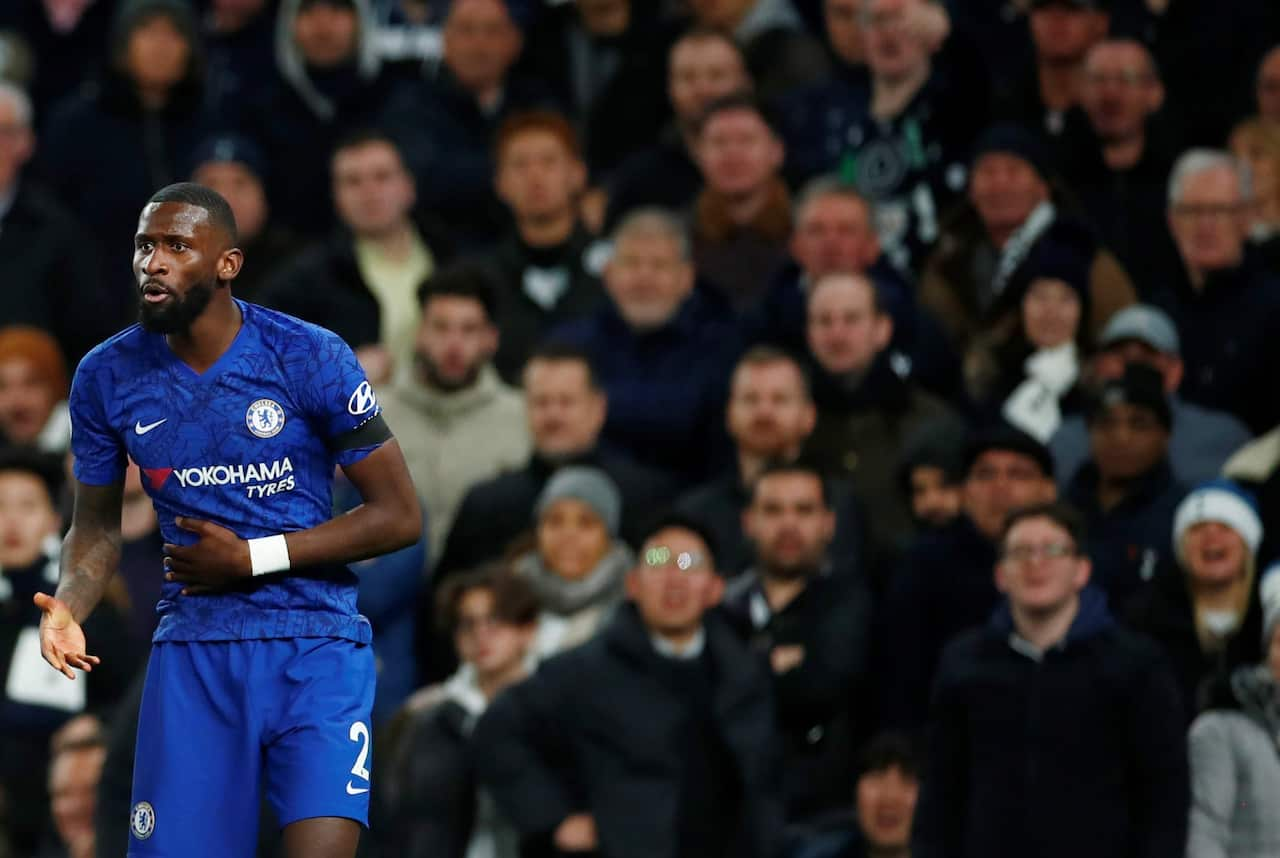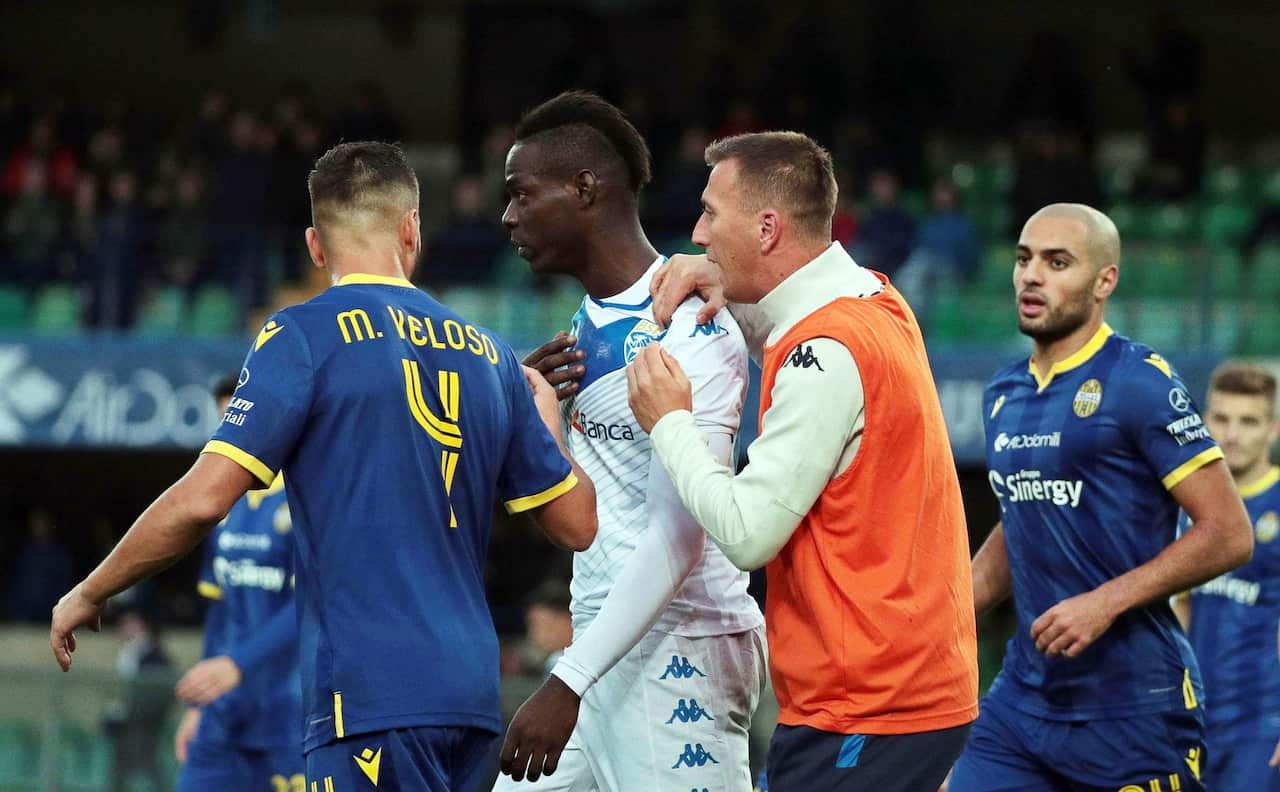Romelu Lukaku was planning on a relaxing evening in front of the TV. He might now find himself playing in Italy, but he was looking forward to following the fortunes of two of his former teams in the Premier League.
His hopes of a quiet night ended long before the games did. Not for the first time this season, he found himself composing a message for his Twitter and Instagram feeds. Not for the first time this season, he felt compelled to speak out against racism.
The cause, in this case, was the front page of the next day’s Corriere Dello Sport, one of Italy’s sports newspapers. Its cover had been posted on Twitter late that evening with images of Lukaku, a Belgian striker whose parents were born in the Democratic Republic of Congo, and Chris Smalling, a former teammate of his who is of Jamaican descent and is now playing for Roma, to tease their teams’ weekend matchup. The headline read: “Black Friday.”
When Lukaku saw it, he was staggered. “It’s crazy,” he replied when he was sent an image of the front page over WhatsApp. He then criticised the paper publicly, saying it was the “dumbest of headlines.”
The mix of disappointment and frustration is a feeling Lukaku has had with dispiriting regularity in recent months. From England’s national team threatening to walk off the field during a game in Bulgaria to a match stopped by racist chants in the Netherlands to more recent incidents at Manchester City earlier this month and at Tottenham on Sunday, black players have reported being targets of racist incidents on what has seemed like a weekly basis in Europe this season. In Italy, it has been particularly virulent. Lukaku was racially abused in his second game after moving to the country this season, a chorus of monkey chants greeting him as he prepared to take a penalty during his Inter Milan team’s game at Cagliari. As he listened to the abuse in a stadium with a long, grim record of such incidents, he said he thought what he has always thought in these situations: “I’m going to score. I’m going to win. I’m going to go home.”
In Italy, it has been particularly virulent. Lukaku was racially abused in his second game after moving to the country this season, a chorus of monkey chants greeting him as he prepared to take a penalty during his Inter Milan team’s game at Cagliari. As he listened to the abuse in a stadium with a long, grim record of such incidents, he said he thought what he has always thought in these situations: “I’m going to score. I’m going to win. I’m going to go home.”

Chelsea defender Antonio Rüdiger reported being subjected to racist gestures and songs in Sunday’s Premier League win at Tottenham. Source: Eddie Keogh/Reuters
“I’ve been confronted by it many times in life,” he said. “You build a type of shell. I take my anger out on the field.”
Outbursts of racism have long disfigured games in Italy and elsewhere in Europe, but the frequency with which they have occurred this season is especially alarming, given the rising nationalist tide across the continent. Italy, for example, saw racially motivated attacks triple after the populist Five Star movement entered into government with the Lega or League, a far-right party, in 2017. That increase is reflected in the experience of black players in the country’s stadiums. The situation has grown so troubling that the Italian league’s clubs were moved to action themselves. In November, all 20 released a public statement admitting they had “not done enough” to address racism in Italian soccer, and informing the country’s authorities that now was the time for “serious change.”
The situation has grown so troubling that the Italian league’s clubs were moved to action themselves. In November, all 20 released a public statement admitting they had “not done enough” to address racism in Italian soccer, and informing the country’s authorities that now was the time for “serious change.”

Brescia's Mario Balotelli was racially abused by fans in Verona in November. Source: Simone Venezia/EPA, via Shutterstock
In the weeks after that statement came the Corriere front page, which the newspaper defended, saying the criticism of it was like a “lynching.” Then Serie A’s general manager was caught on tape suggesting the solution might be muting stadium microphones, so at least the abuse is not broadcast. Last week, Serie A unveiled a new anti-racism initiative featuring three paintings of chimpanzees, provoking a heated backlash that it was tone-deaf.
There have been so many incidents, so many low moments, that it has been hard to keep up. Lukaku has found himself talking, and thinking, about the issue far more frequently than he would have hoped. Education is critical, he said, but he is not prepared to wait for others to address the issue.
“I say what I think,” he said. “If something is on my mind, I will stand up and speak.”
Pace and Power
Lukaku wanted Paul Pogba, a friend long before he was a Manchester United teammate, to be the first to know. Last summer, while they were in Australia on a preseason tour, Lukaku pulled Pogba aside and told him he had decided to leave England. “I told him I was done,” Lukaku said.
Lukaku had reached the conclusion a few months earlier. He had spent close to eight years in England by then, blossoming into one of the world’s best forwards, but his final two, after a $90 million transfer to United, had been arduous.
“It was always, ‘Yes, but …’ right from the start,” he said. “I scored against Real Madrid in the European Super Cup but missed a chance. It was: ‘But he missed that one.’ I scored against West Ham in my first Premier League game: ‘Yes, but. …’ From then on, I started to wonder how it was going to go.”
He still scored goals — 96 games, 42 goals — but he bristles at how his perceived poor form affected his reputation in England. “One year at United erased eight years prior to that,” he said. He feels that he and Pogba were “blamed for Manchester United’s fall.”
He wonders, now, if it was because United had paid so much money for him; he is, in cumulative transfer fees, the third most expensive player in history. There is, though, one other possibility.
There has always been a divergence between the player Lukaku is and the player he is perceived to be. One former manager, Roberto Martínez, always regarded Lukaku as a “thinker,” but that opinion was an outlier in discussions about him. As with many black players, analysis of Lukaku’s performance tends to focus on his strength, his athleticism, his physical attributes.
“It is never about my skill when I am compared to other strikers,” he said. “My one-on-one dribbling is good. I can do a step-over. I can beat a player. I remember one comment from a journalist that United should not sign Lukaku because he is not an ‘intelligent’ footballer.” That one, he said, stung.
It is what he calls the “pace and power element,” and it is hard not to wonder if he is seen that way because he is black. Research by Cynthia Frisby of the University of Missouri has found that black athletes are more likely to be portrayed in the news media as “innately physically gifted, yet lacking in intelligence and strong work ethics.”
In her book, “Pitch Invaders: The Modern Black Football Revolution,” Stella Orakwue wrote that black players are judged “not on the basis of their individuality but on the basis of concocted group characteristics, enshrined in mythology.”
“I don’t see it as that,” Lukaku said. “Players like Thierry Henry, Nicolas Anelka, Marcus Rashford, Anthony Martial are talked about as skilful. It’s just that some players are always seen in a particular way.”
Whatever the reason, by March, Lukaku had endured it enough. He wanted to get away, to “start from zero,” to “rebuild” his reputation. United agreed to sell him to Inter Milan, a club he had admired as a child, when two of his heroes, the Brazilian strikers Ronaldo and Adriano, graced its roster.
Lukaku said that he holds no grudges. “The U.K. had been good to me,” he said. “But I had to bounce.”
The Hardest League in the World
Cristiano Ronaldo was the last player to appear in the tunnel at the San Siro. His Juventus team was in Milan to face Lukaku’s Inter at its towering, iconic home. Both clubs, at that point in early October, were unbeaten. Both were setting a searing pace at the top of Serie A. When Ronaldo spotted Lukaku, he walked over to greet him.
“He told me this is the hardest defensive league in the world,” Lukaku said. “He said he’d scored goals everywhere, but this was the toughest place to do it. And if Cristiano Ronaldo thinks it’s difficult, then it must be really difficult.”
Lukaku, at first glance, has proved Ronaldo wrong: He has 10 goals from his first 16 games for Inter and has struck up a quick, intuitive understanding with his Argentine strike partner, Lautaro Martínez. He insisted, though, that Ronaldo’s scouting report was correct.
“It’s harder than England,” he said. “The football is more intense there, but here everything is pattern of play.” The success he has had in his first few months at Inter, he said, is the product of rigorous hours on the training field, and even more spent poring over video footage, trying to spot a weakness in his opponents.
He is adamant that he is enjoying his time at Inter and his life in Milan. In the course of day-to-day life, he said, people are “chill.” He has noted a contrast between what happens in the country’s stadiums and what happens, to him at least, in its streets.
But that does not diminish what he has had to endure while going to work while scoring goals: what happened at Cagliari and the aftermath; the constant drip of stories about racist abuse unpunished or tacitly encouraged; an unnecessarily provocative front page or outrageously misguided anti-racism campaign. Lukaku is enjoying his life, but he knows it would be understandable, in that climate, if a black player did not feel welcome.
Lukaku plainly says that is not the case for him. He does not feel cowed. He has not allowed it to sour his experience. But that does not mean that he is prepared to tolerate it, or that he believes others should be forced to endure it or wait passively as education improves and ignorance erodes.
By Rory Smith © 2019 The New York Times
Share

